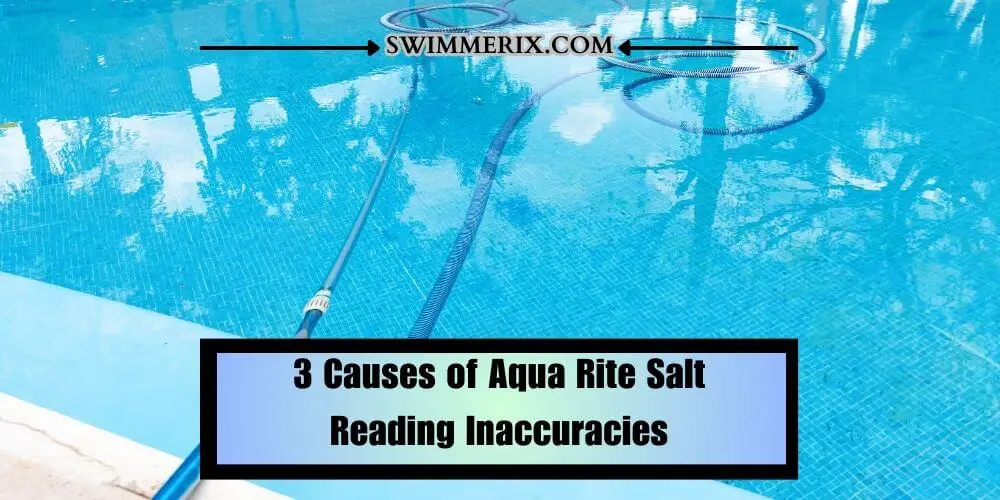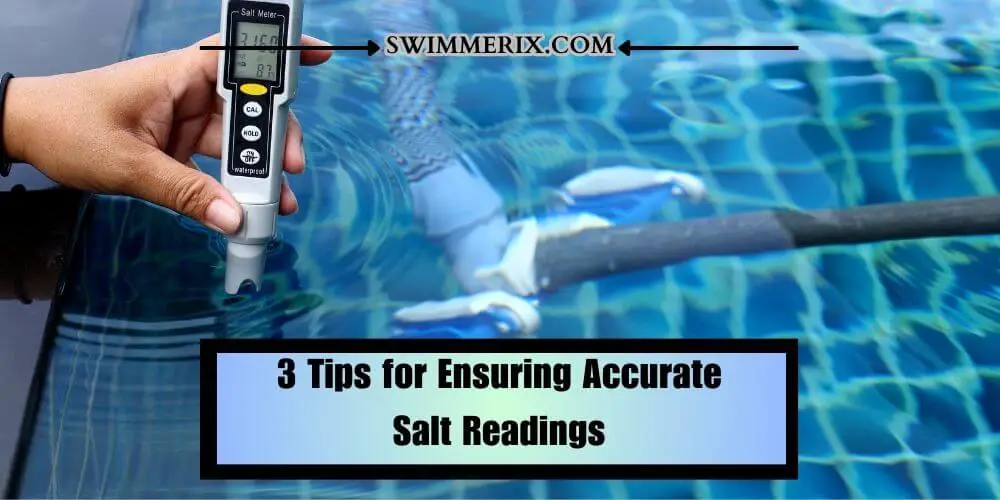
It is important to maintain a clean & properly balanced pool for an enjoyable swimming experience. Except for pool maintenance, one question is ensuring accurate salt reading when using systems like Aqua rite. Many pool owners have frequently complained about encountering issues with their Aqua rite salt reading leading to confusion & potential problems. If you are also wondering about ‘why is my aqua rite salt reading not accurate’ & what you can do about it, this is the article for you.
In the article, you will be driving into the causes of inadequate salt reading with practical solutions. I will also help you learn some practical tips for ensuring accurate reading in the future & balance the salt effectively in your pool.
Before I tell you what’s the solution for ‘Aqua rite salt reading not accurate,’ let’s find out the causes. Below, I will discuss three reasons why your ‘Aqua rite reading is inaccurate.’
3 Causes of Aqua Rite Salt Reading Inaccuracies

1. Build-up of dirt & debris on the salt cell
If your aquarite salt reading is inaccurate, there might be a problem with the salt cell. You should know that salt cells in an Aqua rite system are crucial in converting salt into chlorine. However, over time, dirt, leaves & other debris may accumulate on the salt ce leading to inaccurate Salt readings.
You should know that this build-up acts as a barrier preventing the electrodes from accurately measuring the salt concentration. Therefore if you want to maintain accurate salt readings, I recommend you first inspect & clean the salt cell.
To do that, you first need to turn off the power of the system & start by removing the cell from the plumbing. It would help if you also considered using a high-pressure hose to remove debris carefully. While removing the cell, you should also check for scaling or mineral deposits on it, as this can also severely affect salt reading.
2. Calibration issues
Sometimes calibration issues also lead to inaccurate Salt readings. Calibration is very important for accurate salt reading & if it malfunctions or is not properly calibrated, the displayed salt reading will be inaccurate.
You should know that calibration offset is necessary to adjust the system and achieve accurate measurements. Therefore I recommend you first check the calibration offset. To do it, consider using a salt testing kit that obtains an accurate salt reading from a water sample.
After that, compare this reading with the reading displayed on the accurate system. If you notice a significant display difference, the offset may be required. To adjust the calibration set, you must assess the system setting on the aquarite control panel.
To do that, you should start by looking for the calibration options & adjust the value based on the variance between the actual salt reading & the system display. Also, it would help if you considered referring to the manufacturing instruction for specific steps or details.
3. Faulty salt cell or sensor
In some cases, malfunctioning an accurate salt cell or its sensor leads to inaccurate Salt readings. Therefore I advise you to first check for signs of damage or wear that might be disturbing the electrolysis process & affecting the measurement of salt concentration.
To troubleshoot the issue & resolve it, you will first need to inspect the salt properly for signs of damage & wear. Be careful while examining the salt cell for visible signs of damage like cracks or worn-out electrodes.
If you notice any issues, replace or repair the salt cell. Also, if you suspect that the salt cell or its sensor has gone faulty, it is best to let the pool service technician do it for you. They will have the proper expertise to diagnose the problem accurately & recommend appropriate solutions.
3 Tips for Ensuring Accurate Salt Readings

1. Regular maintenance routines
You must establish a proper regular maintenance routine to maintain accurate salt within an aqua rite system. It would help if you cleaned the salt cell regularly to prevent the build-up of debris & scaling.
Also, make sure that you refer to the manufacturer’s recommendations for specific or proper cleaning techniques. Sometimes checking & adjusting the calibration works to give accurate readings.
Therefore, you should periodically check the calibration of the aquarite system & if necessary, adjust the calibration offset as I described earlier. Also, you should note that monitoring the sensor & cell will give you a more in-depth acknowledgment of the potential culprits for inaccurate readings.
Therefore, you must closely monitor the salt cell & sensor for signs of damage & wear. Also, ensure that you are inspecting these components regularly to identify potential problems at an early stage & take appropriate action promptly.
Performing routine water tests with a reliable testing kit is necessary. To determine if your accurate system is giving you inaccurate readings, consider using a separate water testing kit. This will not only validate the accuracy of the salt reading but also ensure that the pool chemicals are properly maintained.
Well, you must test to check the pH levels, alkalinity, and other key factors and parameters experts often recommend. Also, maintain a proper log of the test results to track any changes over time. Below I am mentioning a table emphasizing recommended frequency for maintaining tasks you must follow.
| Maintenance Task | Frequency |
| Salt cell cleaning | Every 3 months |
| Calibration check | Every month |
| Water testing | Weekly |
| Salt level monitoring | Every 2 weeks |
2. Monitoring & recording salt levels
Also, ensure you consistently monitor the salt level to maintain accurate readings. By tracking the salt level over time, you will be able to detect any irregularities and promptly take appropriate action.
I recommend using a log or pool maintenance app to record the salt reading & other important data. Also, it is important to understand the acceptable range of salt levels for your specific pool type.
Depending on the pool type, it may have specific requirements. Different pool systems have different requirements & maintaining the appropriate salt concentration ensures optimal performance. Therefore, make sure you also refer to the table below for ideal salt levels for different types of pools.
| Pool Type | Ideal Salt Level (ppm) |
| Saltwater pools | 2700-3400 ppm |
| Chlorine pools | 0 ppm |
| Saltwater hot tubs | 1500-2500 ppm |
3. Seeking professional assistance
Even though regular maintenance & troubleshooting can help you address many issues, there may be a few instances where professional assistance will be necessary & you should pay attention to it. Below & are some of such situations when you must consult a pool service technique for proper assessment, diagnosis, & treatment
- Persistent Inaccurate Readings: Despite following maintenance procedures, if you consistently experience inaccurate salt readings, you must take the help of a professional inspection to identify any underlying issue.
- Complex System Issues: While inspecting the aquarite, if you encounter complex issues related to it, like recurring sensor failures or inconsistent performance, you must contact a service technician with expertise in the system to get valuable assistance.
- Long-term Accuracy Assurance: Periodically, you should consult a professional to ensure the long-term accuracy & functionality of your aquarium system. They have all the experience, expertise & knowledge to perform comprehensive inspections & make recommendations to optimize performance tailored to your need & your pool condition/type.
| Also Read |
| Why Does My Pool Smell Like Fish |
| How Long After Gunite Can You Plaster |
| How Soon Can You Swim in a Newly Filled Pool |
| How Long Can You Leave a Pool Unattended |
| Why is the Pool Cloudy After Shock |
Conclusion
Accurate salt reading is important for maintaining a clean & properly balanced cool. This is why I have tried to keep you an appropriate reason behind the problem of ‘aqua rite salt reading not accurate.’
If you follow all the suggested solutions & implement the tips, you will be able to enjoy a trouble-free swimming experience. However, ensure that you are also cleaning the salt cell regularly and maintaining your pool.
Also, ensure to check & adjust the calibration as required while monitoring salt levels diligently. If you need to address complex issues or want to ensure the long-term accuracy of your aqua rite system, never hesitate to seek professional assistance.
Following all these, you can confidently dive into your crystal clear water all summer. I have given my best to give you all the information around the question: ‘Why is your aqua rite salt reading not accurate’ & what can you do about it? If you find this article helpful & fun to read read, consider sharing it.
Your share will help many people learn ‘why is my Aqua rite salt reading not accurate’ & what can they do to troubleshoot it. Do check my other helpful guide on pool care & maintenance. See you in the next post, till then, take care & goodbye.

